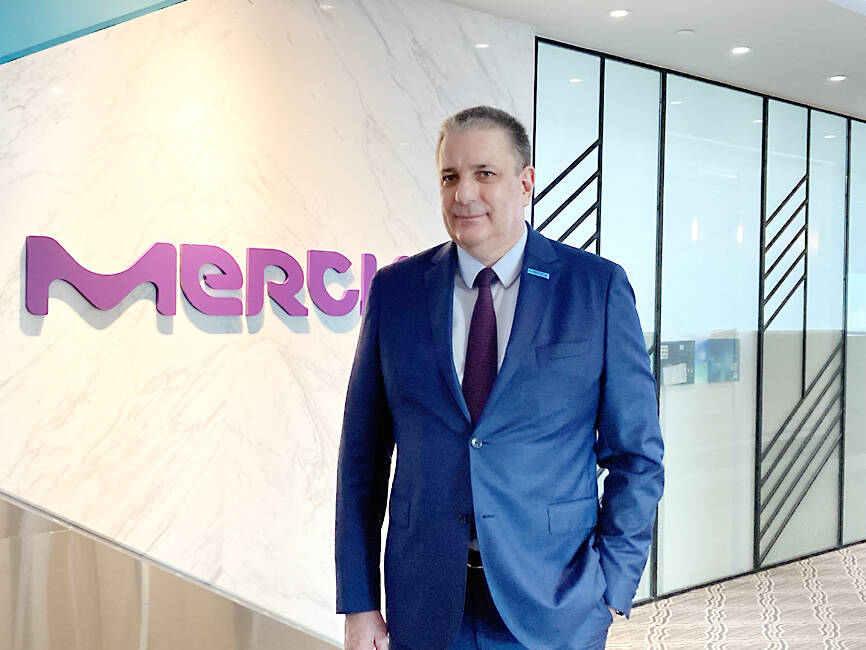Merck Group expects the US’ semiconductor export restrictions on China to have a “low” impact on the company’s electronics business, given China’s minimal exposure to the global cutting-edge semiconductor material market, a company executive said yesterday.
In China, a mere 5 percent of its total semiconductor capacity is leading-edge technology — an insignificant portion of the world’s leading-edge technology market, Merck Electronics CEO Kai Beckmann told reporters in Taipei.
“It is increasing, but it is still a very small basis,” Beckmann said.

Photo: Lisa Wang, Taipei Times
Since the US’ curbs on semiconductor exports limit leading-edge technology, manufacturing tools and materials, the impact on Merck “is low,” he said. “Complying with changing rules is part of our DNA.”
“We are complying with different rules. We are not overly nervous about this one,” he said.
On top of that, Merck has been pursuing a model of creating solutions for strong local supply resilience long before the US chip restrictions, he said.
This model is aimed at proximity to customers, rather than being a response to politics, he said.
“We have a highly localized approach in running our business,” Beckmann said. “We are able to supply our customers locally.”
Such a business strategy has allowed Merck to catch every single order, unhampered by the COVID-19 pandemic lockdown or logistics congestion, he added.
As Taiwan is the world’s biggest consumer of leading-edge semiconductor materials, Merck has built a significant presence, Merck said.
Taiwan makes up 70 percent of the world’s leading-edge semiconductor materials, followed by South Korea, which has a 30 percent share, it said.
The leading-edge technologies refer to 7-nanometer process technology and more advanced technologies, it said.
Merck in February held a groundbreaking ceremony for a new semiconductor solutions mega site in Kaohsiung, as the German company looks to bolster supply chain resilience and growth. The first phase of the site is to start operations in 2026.
When asked about Germany’s budget crisis and its potential impact on bringing new semiconductor capacity expansion in the country, Beckmann said he was “not concerned at all.”
“Eventually the investments to Germany will happen,” he said. “The government will eventually get the budget right.”
Germany’s budget crisis has ignited concerns that Taiwan Semiconductor Manufacturing Co (TSMC, 台積電) could delay or even cancel its plan to build a manufacturing fab in Dresden if no subsidies are available. TSMC has not commented on the matter.
TSMC announced in September that it planned to build a 12-inch wafer fab in Dresden to make automotive chips in partnership with major customers, including Robert Bosch GmbH, Infineon Technologies AG and NXP Semiconductors NV.
Total investment is expected to exceed 10 billion euros (US$10.78 billion), consisting of equity injections, borrowing and support from the EU and German government, TSMC said at the time.

Semiconductor business between Taiwan and the US is a “win-win” model for both sides given the high level of complementarity, the government said yesterday responding to tariff threats from US President Donald Trump. Home to the world’s largest contract chipmaker, Taiwan Semiconductor Manufacturing Co (TSMC, 台積電), Taiwan is a key link in the global technology supply chain for companies such as Apple Inc and Nvidia Corp. Trump said on Monday he plans to impose tariffs on imported chips, pharmaceuticals and steel in an effort to get the producers to make them in the US. “Taiwan and the US semiconductor and other technology industries

SMALL AND EFFICIENT: The Chinese AI app’s initial success has spurred worries in the US that its tech giants’ massive AI spending needs re-evaluation, a market strategist said Chinese artificial intelligence (AI) start-up DeepSeek’s (深度求索) eponymous AI assistant rocketed to the top of Apple Inc’s iPhone download charts, stirring doubts in Silicon Valley about the strength of the US’ technological dominance. The app’s underlying AI model is widely seen as competitive with OpenAI and Meta Platforms Inc’s latest. Its claim that it cost much less to train and develop triggered share moves across Asia’s supply chain. Chinese tech firms linked to DeepSeek, such as Iflytek Co (科大訊飛), surged yesterday, while chipmaking tool makers like Advantest Corp slumped on the potential threat to demand for Nvidia Corp’s AI accelerators. US stock

The US Federal Reserve is expected to announce a pause in rate cuts on Wednesday, as policymakers look to continue tackling inflation under close and vocal scrutiny from US President Donald Trump. The Fed cut its key lending rate by a full percentage point in the final four months of last year and indicated it would move more cautiously going forward amid an uptick in inflation away from its long-term target of 2 percent. “I think they will do nothing, and I think they should do nothing,” Federal Reserve Bank of St Louis former president Jim Bullard said. “I think the

SUBSIDIES: The nominee for commerce secretary indicated the Trump administration wants to put its stamp on the plan, but not unravel it entirely US President Donald Trump’s pick to lead the agency in charge of a US$52 billion semiconductor subsidy program declined to give it unqualified support, raising questions about the disbursement of funds to companies like Intel Corp and Taiwan Semiconductor Manufacturing Co (台積電). “I can’t say that I can honor something I haven’t read,” Howard Lutnick, Trump’s nominee for commerce secretary, said of the binding CHIPS and Science Act awards in a confirmation hearing on Wednesday. “To the extent monies have been disbursed, I would commit to rigorously enforcing documents that have been signed by those companies to make sure we get